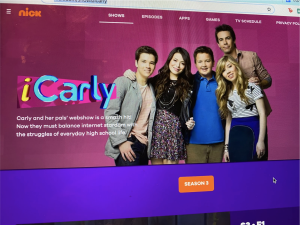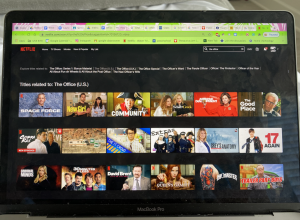‘Ginny and Georgia’ controversy is misplaced, misunderstood

Ginny and Georgia premiered on Netflix in late February, but since then they have faced immense backlash for a line mentioning Taylor Swift’s dating life.
I love Taylor Swift. She was my most listened to artist of 2020, and I’ve seen her documentary, “Miss Americana,” more times than I can count. Just three months ago I wrote a rave review of her album, “evermore.” However, on March 1, Swift tweeted in regards to the Netflix’s show “Ginny and Georgia.” This tweet, and the aftermath that followed, was a clear demonstration of the destructive consequences of assuming the worst.
The new Netflix show “Ginny and Georgia” was released on Feb. 24 and features the story of a single mother, Georgia (Brianne Howey), and her daughter, Ginny (Antonia Gentry), adapting to their new neighborhood in Massachusetts after inheriting wealth from Georgia’s recently-passed husband.
Upon hearing of the show’s release, I decided to give it a chance. I knew some of the actors from their prior work, and the plot seemed relatively interesting. I am not going to pretend that this was the best show I have ever seen or that the writing was phenomenal, but the mystery about Georgia’s past and the interesting high school characters kept me engrossed.
I finished the 10 episode series in three days and was satisfied with the ending. Once the credits of episode 10 aired, I was ready to move on from the show; however, the media storm that followed kept me interested.
The weekend after the release, a line from the show began to circulate around Twitter from the character Ginny.
“What do you care? You go through men faster than Taylor Swift,” Ginny said to her mother.
People began calling out Netflix for letting the line air. Within hours, “RESPECT TAYLOR SWIFT” had flooded the response section of Netflix’s Twitter account and their Instagram comment section. The next morning, Swift tweeted her own response to the show, calling out the “lazy” and “deeply sexist” joke.
Swift fueled the fire of her fans, but then turned a blind eye to her fans rude remarks to the show’s cast. For instance fans began attacking Gentry, commenting on her posts “RESPECT TAYLOR SWIFT” and using the snake emoji.
I am not going to deny that this line is misogynistic. Since the start of Swift’s career, this joke has been made time and time again. She has been degraded by the media for years for relationships, while her male counterparts have been able to get away with the same dating patterns.
On the surface, the line is a jab at Swift; however, when looked at with the greater context of the series, it’s meant to reflect Ginny’s character flaws. She’s 16 years old; she’s immature; she’s an adolescent, and she’s making mistakes. The line is wrong, and that’s the point. It represents a flawed viewpoint. It speaks to the internal struggle that teenage girls feel while trying to reconcile female sexuality with societal expectations of women that demand perfect chastity.
A single line, or even a single character, cannot represent the complexities that make up the moral standpoint of a narrative. Ginny Miller is not an arbiter of morality in contemporary society, nor even within the confines of the show’s fictional universe. She is, and should be understood as imperfect, both by her fellow characters and viewers of the show. That’s what Swift and her fans missed when jumping to conclusions about the show.
Swift took part in the very “cancel culture” that she has been a victim of. In 2016, when Swift was thrown into a media storm following her leaked phone call with Kayne West, most of people’s newfound assumptions about her were made because they didn’t know the full story. This very same phenomenon is happening now with “Ginny and Georgia.”
“Ginny and Georgia” has a value that reaches far wider than one line. The show was created by a woman, and of the nine main cast characters, five of them are females. Much of the plot is focused on Ginny exploring her identity as a biracial female and the impact it has on her day-to-day life. While Swift’s tweet may not lead to the cancellation of the show, the number of people who may have watched and benefitted from the show probably lessened.
This is where my issue with Swift’s tweet lies. By expressing her opinion through Twitter, Swift, as a white woman, is not only taking attention away from several women and people of color, but also taking viewers away from a show where underrepresented groups can see themselves and their feelings represented. Being a true feminst is being an intersectional feminist, but Swift failed to acknowledge how her tweet would impact those other groups.
Swift has immense power to make change, and while I understand her taking offense to the line, I don’t think taking to Twitter to share her views was the best avenue to fight for female equality. Swift could have reached out to executives at Netflix or focused her opinion towards the writer’s room of the show.
Art and media are not things that can be interpreted at face value. Failure to understand context beyond one line obscures the broader themes of the show and sacrifices the value it may have if duly considered. This is especially true of Ginny and Georgia, a show that elevated the voices of minority groups and told a meaningful and much-needed story about the struggles of female adolescence.
Ultimately, the actions taken by Swift and her fans aren’t reversible, but they do necessitate recompense, or, at the very least, productive discourse that does not seek to assign blame, but instead determine the best way forward for Swift and for the show.

Editor-in-Chief Katie Simons ’22 has found her niche in the field of journalism, her interest blooming at a young age.
“Growing up, my dad had...

Editor-in-Chief Katie Simons ’22 has found her niche in the field of journalism, her interest blooming at a young age.
“Growing up, my dad had...





















































